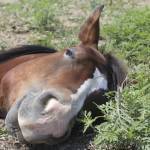Impact of Low Blood Sugar in Horses

Hangry: the state of being simultaneously hungry and angry, the latter often being a consequence of the former, potentially as a result of low blood sugar.
As many of us know, horses can be hangry, too. Just like people, horses develop low blood sugar. “In cases of severely low blood sugar levels, a condition called neuroglycopenia develops. Horses diagnosed with neuroglycopenia have a shortage of glucose in the brain, mirroring low blood sugar levels,” relayed Kathleen Crandell, Ph.D., a Kentucky Equine Research nutritionist.
She added, “These horses can develop tremors, fatigue, cognitive failure, intermittent blindness and deafness, seizures, and coma, potentially culminating in death if left untreated.”
To improve our understanding of hypoglycemia and neuroglycopenia in horses, one group of veterinarians recently reviewed* the medical records of 90 horses and foals with various degrees of low blood sugar. They discovered:
-
Hypoglycemia can be confirmed by a blood glucose level <75 mg/dL;
-
Hypoglycemia occurs in both adults and foals;
-
Common causes of hypoglycemia include sepsis (systemic infection), liver disease, colic, colitis, and neoplasia;
-
In adult horses, elevated levels of triglycerides (fats) unrelated to liver disease were also associated with hypoglycemia. For example, horses with kidney or respiratory disease causing anorexia had elevated fat levels but decreased circulating sugar levels;
-
Horses with neurological deficits such as seizures and disorientation had a low level of glucose in the blood and cerebrospinal fluid; and
-
A blood glucose value <42 mg/dL was determined to be the point at which severe altered states of consciousness and seizures occur.
“In adults, the primary causes of hypoglycemia relate to the body’s increased use of available glucose or decreased production, metabolism, storage, and transport of glucose throughout the body. Glucose drives the vast majority of the body’s systems, particularly the central nervous system,” Crandell explained.
Neuroglycopenia-related neurological impairments occur relatively infrequently in horses. When it does occur in adults, liver and gastrointestinal disease should be viewed as the most common culprits.
“To ensure your horse’s diet meets its current health needs, particularly if an underlying medical condition exists, contact a Kentucky Equine Research nutrition advisor for a consult today,” recommended Crandell.
*Aleman, M., L.R.R. Costa, C. Crowe, et al. Presumed neuroglycopenia caused by severe hypoglycemia in horses. Journal of Veterinary Internal Medicine. In press.








